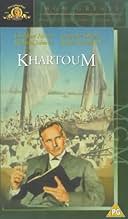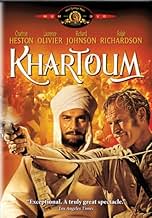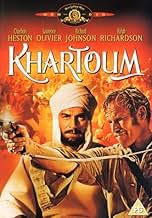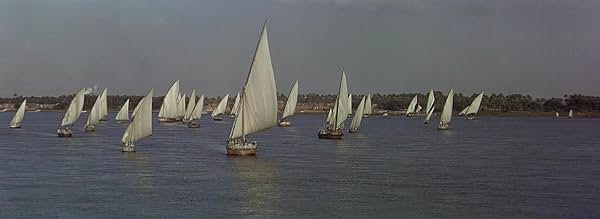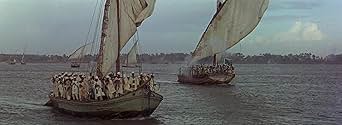No Sudão Anglo-Egípcio surgiu um pregador que se declarou o Messias do Islão: o Mahdi. Decidido a impedir um massacre, o governo britânico envia o General Gordon numa missão quase impossível... Ler tudoNo Sudão Anglo-Egípcio surgiu um pregador que se declarou o Messias do Islão: o Mahdi. Decidido a impedir um massacre, o governo britânico envia o General Gordon numa missão quase impossível: defender a cidade de Cartum.No Sudão Anglo-Egípcio surgiu um pregador que se declarou o Messias do Islão: o Mahdi. Decidido a impedir um massacre, o governo britânico envia o General Gordon numa missão quase impossível: defender a cidade de Cartum.
- Indicado a 1 Oscar
- 3 indicações no total
- Herbin
- (não creditado)
- assistant, messenger to Gordon
- (não creditado)
Avaliações em destaque
He was also distrusted by the Establishment. A brilliant tactician and commander of troops he was constantly passed over for postings abroad because he was unpredictable. When he was asked to report on the grievances of the Basuto people by the British administration in South Africa, he sided with the Basuto and was shipped home very quickly. As Captain Willard says in 'Apocalypse Now': "They didn't dig what he had to tell them." You have to remember, too, that Gordon was a national hero. This was like firing Norman Schwarzkopf after the Gulf War.
The film fails to touch the depths of Gordon's character and in some cases is well off the mark (Charlton Heston seems far too interested in that Egyptian dancer!). We are shown that Gordon could be ruthless in the pursuit of justice (he executes a servant for theft, regardless of any personal feelings).
The fact remains that Gordon was a man of enormous moral and physical courage. He would not desert Khartoum and leave the people to be slaughtered. It now seems likely (and more in character) that he died fighting to the end.
The film is a tribute to that courage and some of the best moments occur when we are allowed to see the twinges of self-doubt and anxiety that Gordon suffered and overcame. The well-staged action scenes are like decoration on the moral diemmas at the heart of the film. Charlton Heston is physically wrong for the part but gives one of his best performances. He isn't outclassed by Olivier in any way, an achievement in itself.
I first saw this some years ago and found it impressive but maybe I've seen Lawrence of Arabia too often in the interim. It owes a lot of Lawrence, appearing as it did four years after. As in Lawrence,a lone British officer is sent to the desert to set things straight. He's mysterious, a paradox. He rides camels and gets into battles with the enemy. He fails in his mission.
Well, Charlton Heston as "Chinese" Gordon doesn't really seem too mysterious when you come down to it, even though he himself tells us, "My life is not an open book. Not to you, not to any man. Not even to myself." Yet he's a pretty normal guy. People keep calling him "vain" behind his back but it doesn't seem like vanity to me when you're trapped behind the lines and expect the British, who sent you there in the first place, to come and get you out.
Actually Heston is pretty good. His mass is imposing. His uniforms are splendiferous. His acting doesn't shoot out the lights but he's convincing because Gordon is well within his range. Olivier, as the Mahdi, "the expected one," the kind of rabid charismatic warrior that religions seem to generate on a regular basis, gives a little better performance because, let's face it, he's a more efficient ham. You killed to prevent killing, he tells Gorden. "I kill to prevent more killing. Tell me, Gordon Pasha, where is the difference?" And he holds both his hands up and gives them a little twist, while looking slyly out of the corner of his eyes at Heston. For Heston such techniques would be infra dig. Olivier plays this in blackface, by the way. All of the Egyptians, as well as the Sudanese, are in blackface. Man, these Egyptians are dark. Not just swarthy. Not even dark like sub-Saharan Africa is dark, but a shiny bluish-black like a freshly polished boot.
It's not a bad film and it does describe Gordon and his predicament in intelligible terms. We're never at a loss for what's going on. But Lawrence of Arabia, inevitably, keeps springing to mind. And Khartoum seems plodding by comparison, especially in the direction. You may remember, to take a single example, the scene in which Lawrence and his irregulars blow up a train and then puncture the cars with machine gun bullets. Lawrence shouts for them to cease fire because the passenger cars are being turned into lacework. Nobody hears him, so he fires a flare. No one pays attention, so Lawrence must run out in front of his own guns screaming at his men to stop shooting. Finally the firing sputters raggedly to a stop.
There's nothing like that here. In this movie, Gordon generals a battle on horseback with the Madhi's supporters and everybody -- every one of the extras -- runs to his mark and does what he's supposed to. The battles are full of the same extras in long shot, slashing away at each other with scimitars or whatever they are. Nobody seems to get dirty. The dialogue is strictly functional. And one has to think of Lean's USE of the desert setting. That fulsomely ominous vermilion sun peeking up over the flat spirit level of a horizon at dawn. We have the desert here too, but it might almost have been a painted backdrop. It isn't a presence. Dearden uses a lot of swooping helicopter shots as if to say, "Wow -- what a vast emptiness." But we don't get to KNOW it. We don't get to see its rocks or its animals or is leisurely dust devils. It might as well be a studio jungle as a desert.
The score is good, though. It borrows from Eric Wolfgang Korngold but it's effective -- sweeping, majestic, and rife with breast-bursting button-popping imperial sentiment.
In the end it's a watchable epic movie. If you haven't seen Lawrence of Arabia, rent the two of them and show them in succession -- if you can stay awake that long. It's the difference between a good-enough movie and a great movie.
The picture has extraordinary interpretations from main actors . Charlton Heston as the thoughtful and impulsive General Charles George Gordon is top-notch and Laurence Olivier as the fanatic Muslim is awesome . Heston actually did bear a remarkable resemblance to Major General Gordon , but he was considerably taller than the real Gordon . While Laurence Olivier has an extreme make-up to incarnate the religious fanatic , Ahmed El Mahdi , ¨the Expected One¨ . The support cast is equally outstanding , thus : Ralph Richardson (as Gladstone), Nigel Green (Wolsey) , Peter Arne (Kitchener) , among others . The film was based on facts , though was really criticized for neglecting to mention the many very good reasons why Prime Minister Gladstone was reluctant to send an army into the Sudan . The colorful and shimmer cinematography by Edward Scaife is magnificent , being well reflected in desert landscapes ; it was shot in Ultra Panavision , though was later reduced for exhibition in 70mm and 35mm release prints . Production design is overwhelming , it is the best part of the film , including a giant screen originally exhibited in Cinerama venues . Battles staged by Yakima Canutt are spellbound and spectacular . Frank Cordell's musical score is rousing and impressively adjusted to historical film . The motion picture was perfectly directed by Basil Dearden , though Lewis Gilbert was attached as director at one point . The yarn will appeal to historic epic buffs and Charlton Heston fans . Rating : Very Good . Above average, well worth watching .
Você sabia?
- CuriosidadesKhartoum (1966) was analyzed by David Levering Lewis in the 1995 book "Past Imperfect: History According to the Movies," edited by Mark C. Carnes. The article notes that producer Julian Blaustein sent a copy of the script to the real-life Mahdi's grandson, who responded that although his grandfather and General Charles "Chinese" Gordon never actually met, "...it's a very fine script." When Blaustein apologized for this error, the grandson replied, "Ah, but Mr. Blaustein, they should have."
- Erros de gravaçãoPrime Minister Gladstone is shown in Parliament sitting on a red bench. The benches of the House of Commons have traditionally always been green.
- Citações
Col. J.D.H. Stewart: Why did you let them talk you into this mission?
Gen. Charles 'Chinese' Gordon: As is well known, I, ah..regard myself as a religious man, yet I belong to no church. I'm an able soldier, yet I abhor armies. I can even add that I've been introduced to hundreds of women, but never married. in other words, no one's ever talked me into anything.
- Versões alternativasThe cinema version was uncut but UK video and DVD releases were cut by 29 secs by the BBFC to edit footage of dangerous horsefalls.
- ConexõesEdited into O Túnel do Tempo: Raiders from Outer Space (1967)
Principais escolhas
- How long is Khartoum?Fornecido pela Alexa
Detalhes
Bilheteria
- Orçamento
- US$ 6.000.000 (estimativa)
- Tempo de duração
- 2 h 14 min(134 min)
- Proporção
- 2.76 : 1



